
By Taiping Chang
Background: The term “earmark” first appeared in English around 1591, when it was used in its literal and original meaning: farmers marking their livestock animals such as pigs or cows through a little cut or mark in the ear to identify the ownership. However the meaning associated with the term nowadays in the U.S. has become a major political metaphor. Earmarking means “to designate” or “to set aside” specific amounts of government funding for specific projects by U.S. congressional members.
The term “pork barrel” traces its origin back to the slavery era before the U.S. Civil War (1861—1865). In those days, slave owners occasionally gave out a barrel of salt pork to award their slaves for their good behaviors. After the Civil War, the term was used in a derogatory sense, referring to the appropriation of government funding for certain projects that are intended primarily to benefit particular constituents or campaign contributors.
___________________________________________________________
Tina: Did you know that the term “earmark” no longer is used in the context of livestock animals’ ownership?
Tom: I know. “Earmark” has become a political metaphor.
Tina: Did you know that congressional earmarks are used as guarantees of federal funding?
Tom: How does it work?
Tina: Well, when lobbyists, contractors or some influential individuals give big contributions to congressional members during their campaigns, they expect something in return once the candidates are elected.
Tom: So the elected politicians figure out a way to secure millions of dollars of federal funding for certain big-spending projects in return?
Tina: Exactly. Because earmarks are hard to identify, some members use them to secretly award political support from constituents and cohorts.
Tom: Do the earmarked funds need to be approved by Congress?
Tina: No, the funds are not subject to approval by members of the Congress.
Tom: How about oversight of the public? I mean public hearing or review?
Tina: No, it does not require public hearing or review either. Congress can award no-bid contracts at its discretion.
Tom: So as far as earmarks are concerned, there is no transparency or accountability in the system?
Tina: No.
Tom: I can’t believe it. How does it work then?
Tina: Normally this type of spending is inserted into non-related bills to direct funds to a specific project or recipient as incentives or awards for big campaign donors.
Tom: I assume the more powerful members of the U.S. Congress assign more earmarks for their supporters.
Tina: Indeed, and members of the Appropriations Committees in the House and Senate are in the best position to secure earmarks.
Tom: I suppose the secrecy of the earmarking process will encourage some unethical deals.
Tina: Not only unethical deals, but also some corrupt behaviors as well. Can you imagine how many billions of dollars would be wasted by some corrupt contractors whose work is not even regulated by the Congress?
Tom: How awful! Are “earmark” spending and “pork barrel” spending related?
Tina: Yes, “earmark” and “pork barrel” spending are often treated as synonyms, but they are not quite the same.
Tom: What are the differences?
Tina: Well, some say that an earmark is an objective determination, and the “pork-barrel” spending is a subjective expenditure.
Tom: I am not sure I understand what an objective determination or a subjective expenditure is.
Tina: It’s hard to explain. Let me put this way: one man’s pork is another man’s barrel.
Tom: Hmmmm, I still don’t get it.
Tina: Pork barrel spending is money being spent on something that’s not essential, but used to pay off a special interest or to “buy a vote” in the legislation.
Tom: So pork barrel spending refers to government spending that is intended to benefit a lawmaker’s constituent in return for his or her political support or vote in legislation?
Tina: Yes, that’s pretty much the way it works.
Tom: I have heard the expression “bringing home the bacon.” Does this mean that a lawmaker supplies his or her constituents with pork barrel funding?
Tina: Exactly. Both pork barrel and earmark spending are wasteful government spending, which cost tax payers billions of dollars each year.
Tom: I believe that the federal government should use tax payers’ money wisely and responsibly.
Tina: I could not agree with you more.
Vocabulary
earmark (在牛、羊等牲畜的耳朵上)打記號(hào),作為識(shí)別的標(biāo)記,后來(lái)引申作“指定”某筆款項(xiàng)的特殊用途
pork barrel 豬肉桶,即一桶豬肉,用來(lái)比喻政治上的“分肥”。指美國(guó)國(guó)會(huì)議員為了報(bào)答支持者的政治捐款,從各州的稅收中撥出用于該議員地方福利的一筆款項(xiàng)
literal 照字面的,原義的
livestock 家畜,牲畜
designate 指派,選定
set aside 留出,撥出(金錢(qián)、時(shí)間等)
congressional (美國(guó))國(guó)會(huì)的,包括由參議院和眾議院組成的民意代表機(jī)構(gòu)
derogatory sense 貶損的意思
appropriation 挪用,占用
constituent 選民;具有選舉權(quán)的代表
campaign contributor 競(jìng)選活動(dòng)的捐款人
political metaphor 政治上的比喻說(shuō)法
guarantee 保證(契約)金
lobbyist (對(duì)政府官員進(jìn)行游說(shuō)的)說(shuō)客
contractor (工程方面的)承包商,承辦人
contribution 這里指的是政治方面的“捐獻(xiàn)”
cohort 擁護(hù)者,支持者,同僚
oversight 監(jiān)督,監(jiān)視
public hearing 公聽(tīng)會(huì)。任何與公共設(shè)施有關(guān)的工程,在政府批準(zhǔn)之前,都需先舉行公聽(tīng)會(huì),讓老百姓不論贊成或反對(duì),都能夠就該項(xiàng)工程自由發(fā)表意見(jiàn)
no-bid contract 不經(jīng)過(guò)投標(biāo)的合同。一般想爭(zhēng)取政府的工作項(xiàng)目,都必須經(jīng)過(guò)投標(biāo)的手續(xù),但這類(lèi)的合同,不需經(jīng)過(guò)這道手續(xù)
at its discretion 自行決定,自行處理
transparency or accountability 透明度或職責(zé)
incentive 獎(jiǎng)勵(lì),優(yōu)惠,好處
assign 分派,分配
Appropriations Committees (專(zhuān)指美國(guó)國(guó)會(huì)的)撥款委員會(huì)
House 這個(gè)字要大寫(xiě),指的是美國(guó)的眾議院。全詞作 “House of Representatives”,簡(jiǎn)稱(chēng) “House”
Senate 美國(guó)的參議院
unethical deals (商業(yè)上)不道德的交易,這類(lèi)的交易雖然不合乎道德規(guī)范,但并不一定觸犯法律
synonym 同義字
objective 客觀的,下句出現(xiàn)的subjective是其反義詞,意為“主觀的”
expenditure 支出,經(jīng)費(fèi)
bringing home the bacon 原來(lái)的意思是:把培根(一種熏肉)帶回家。引申的意思是:成功地完成任務(wù);給自己的家鄉(xiāng)帶來(lái)好處
(來(lái)源:英語(yǔ)學(xué)習(xí)雜志)
